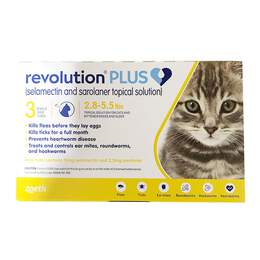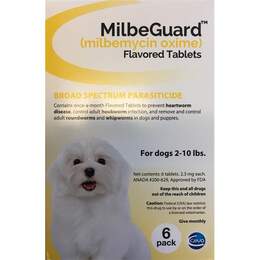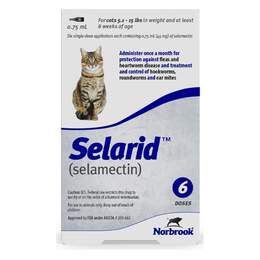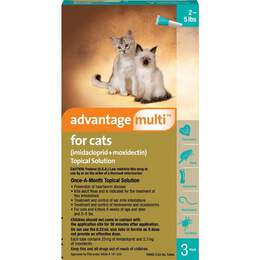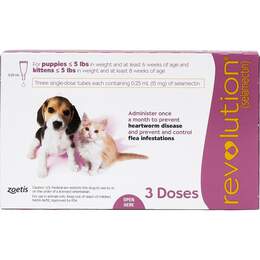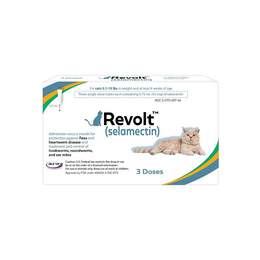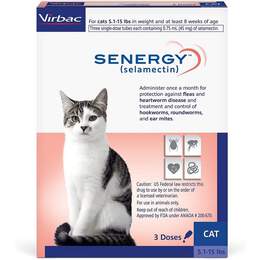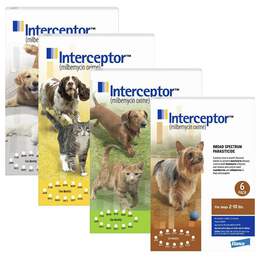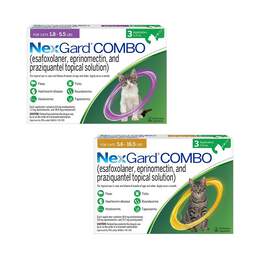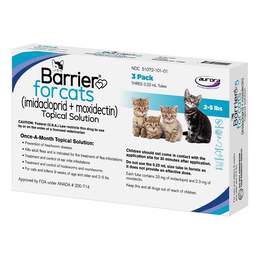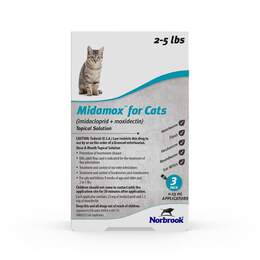Heartworm Medicine for Cats
Heartworm disease is a severe, potentially fatal condition. If you have a dog, you’re probably already familiar with heartworm treatment for dogs. You may be surprised to learn, however, that cats should also take heartworm medication.
While dogs are a natural host for heartworms, cats are not. Most heartworms in cats don't make it to the adult stage, but that doesn't mean they won't harm your pet. Cats that have adult worms usually have one to three worms, and in many cats affected by heartworms, none of the worms reach the adult stage. This means that heartworm disease often goes undiagnosed in cats, but that doesn't mean cats are in the clear. Because of this, heartworm prevention for cats is critical to maintaining their health.
While heartworm in cats is much different than it is in dogs, the mode of action of a heartworm is the same for both. Transmitted by mosquitoes from an infected animal to your pet, these foot-long worms make a home in your cat’s lungs, blood vessels, and heart. Cats normally have fewer worms than dogs, but this doesn’t mean they can’t still do serious damage.
Of all the disorders that can put a cat's physical well-being at risk and possibly threaten their life, almost none are as insidious as feline heartworm disease. Once heartworm is introduced into the cat's bloodstream via a mosquito bite, the larvae thrive and grow in the cat's body over a period of about eight months. The infection begins in the tissues just under the skin, moves on to muscle tissue, and eventually makes its way to the right ventricle of the cat's heart and lungs as well as the arteries surrounding these organs.
However, heartworms can cause issues in your cat before they are full grown. About sixty to one hundred days after the initial bite, the worms can affect a cat's body even though they are still immature. When these immature worms reach the lungs' small arteries, the cat's body launches an inflammatory response that damages the arteries, the small airways in the lungs, and air sacs that help oxygenate the blood.
So, although the name heartworms imply that only the heart is affected, in cats, the disease mainly affects the lungs. Heartworms in cats can lead to a condition known as HARD (heartworm-associated respiratory disease).
Because heartworm disease progresses slowly, it can often have devastating effects to your cat before you even realize an infection is present. You may wonder how to treat heartworms in cats. Sadly, heartworm treatments are safe for dogs, but they are not for cats. For this reason, heartworm medicine for cats is especially important.
Clinical Signs of Heartworm Disease in Cats
Since there are no specific clinical signs of heartworm disease in cats, diagnosing it can be a challenge. The most common signs include rapid breathing and sudden onset of coughing, which are also signs of several other conditions. Other non-specific symptoms commonly seen in cats with heartworm disease include vomiting and weight loss.
While severity can run the gamut, the signs to look for include:
- Seizures or convulsions
- Fainting
- Lethargy
- Trouble walking
- Weight loss
- Intermittent vomiting that may contain blood
- Labored breathing/attacks that seem like asthma
- Decreased or loss of appetite
- Coughing and gagging
- Accumulation of fluid in the abdomen
- Blindness
- Collapse
- Death
Rapid and difficulty breathing, gagging and coughing, diarrhea, and intermittent vomiting can all be confused with feline asthma or other bronchial diseases. In addition, some cats may show no symptoms of a heartworm infection, and some could show obvious signs of a serious problem. And in some cases, if a cat survives heartworm infection, they may be weakened and succumb to another disease. And sadly, some cats may suddenly die.
Because cats may be unknowingly suffering from a serious, harmful infection, heartworm prevention for cats is imperative.
How Often Do Cats Get Heartworms?
Until recently, many people thought that cats rarely or never get heartworms. This is a misperception. A more accurate characterization would be that heartworm infection in cats is different than it is in dogs, but not necessarily rare. And since most cats are indoor cats these days, many people think the risk is relatively low. However, although outdoor cats are more likely to get bitten by a mosquito carrying heartworm larvae than an indoor cat, that doesn't mean there is no risk.
Adding to the misperception is the difficulty in getting a proper diagnosis of heartworm disease in cats. No single test can detect the different stages, so often a combination of a blood test, imaging results, and clinical signs are used to confirm the diagnosis.
All fifty states have heartworm cases, although some have more of them than others. This makes the risks difficult to assess or predict. Rates of infection can vary from year to year and even within geographical areas. For this reason, it is recommended that you test your cat regularly and give them heartworm medicine for cats monthly.
Preventing Heartworm Disease in Cats
Unlike when dogs get heartworm disease, if cats get it, the disease is untreatable. Since there is no treatment available for cats with heartworm disease, the goal is to stabilize the cat and develop a long-term management strategy.
The disease can progress rapidly, and the powerful medications used to fight heartworms in dogs can be fatal to cats. This means that prevention is even more critical for cats.
Whether you choose a preventative administered in pill form, a spot-on topical, or an injection, or product that prevents heartworms and fleas, such as revolution flea treatment, all FDA-approved heartworm meds for cats work in the same way. They eliminate the heartworms at the immature or larval stage of their lifecycle.
An immature heartworm can molt into the adult stage quickly, in as little time as fifty-one days. The adult heartworms cannot be eliminated by preventives, so it is important to make sure they do not reach this stage. This makes ensuring that heartworm preventatives are given to your cat on schedule – monthly for topicals and oral meds and injections every six months. Late administering of heartworm prevention risks allows immature worms to molt into adults, which are harder to prevent and manage.
Kittens run just as much risk of getting heartworm disease as adult cats do. For this reason, it is recommended that kittens be put on heartworm prevention as early as specified by the product's labeling or no later than eight weeks of age.
Heartworm medication dosage is based on weight, not age. Kittens grow like crazy in the first months of their life, and their growth rate can vary depending on their breed. Because they grow so fast, a kitten can gain enough weight to move from one dosage range to another in just a few weeks. Check with your veterinarian about how and when to anticipate a dosage change. Heartworm pills for cats can help you control the dosage until your kitten reaches their full growth.
It is also important to bring your kitten in for all scheduled wellness exams to make sure you stay on top of heartworm protection and other health issues. Have your kitten weighed at each visit to ensure you are giving them the correct dosage of heartworm prevention.
WHAT IS THE BEST HEARTWORM MEDICATION FOR CATS?
Your veterinarian can discuss the different options with you to determine the best heartworm prevention for your cat. While over-the-counter heartworm prevention for cats is not available due to FDA regulations, this should not deter pet parents from protecting their cats. Heartworm preventives can only be purchased from a veterinarian or a pet pharmacy with a prescription.
Your veterinarian will test your cat for heartworm to ensure there are no adult heartworms present before writing a prescription for a preventive. This is because administering a preventive if adult heartworms are present can cause rare but, in some cases, severe reactions that can be harmful or even lead to death. If no adult worms are detected, the test is negative, and a preventive medication can be prescribed. Kittens generally don't need to be tested before starting preventives since it can take about six months for heartworm larvae to reach the adult stage.
Discuss heartworm treatment for cats with your vet at your next visit! If you’re looking for cat dewormer, some with and some without heartworm protection, Allivet carries all the best brands! Some of the best options for heartworm medication for cats are:
- Revolution or Revolution Plus: Revolution is a topical heartworm prevention for cats. It uses Selamectin to prevent heartworms. It also offers protection from fleas, sarcoptic mange, and ear mites. For broad-spectrum protection, Revolution Plus contains both Selamectin and Sarolaner to prevent the same parasites as Revolution. However, Revolution Plus also kills adult fleas and treats existing ear mite infections. It treats and controls ticks, hookworms, and roundworms. Both options are safe for use in kittens.
- Interceptor: With the active ingredient Milbemycin Oxime, this heartworm medication for cats removes and controls adult roundworm and whipworm infections. This chewable heartworm pill for cats also controls adult hookworms and prevents heartworm, and it is safe for kittens.
- Advantage Multi: This topical heartworm prevention for cats combines Moxidectin and Imidacloprid to treat kittens and cats for roundworms, hookworms, and fleas. It treats and controls ear mites and fleas, and it is an effective heartworm preventative.
- Heartgard: This chewable heartworm medication for cats contains Ivermectin to prevent heartworm disease in kittens and cats. It also removes and controls hookworms.
- MilbeGuard: With Milbemycin Oxime, these flavored tablets are safe for kittens and cats. This effective heartworm medication for cats prevents heartworms, controls hookworms, and removes and controls whipworms and roundworms.
- Selarid: This topical heartworm medication for cats uses the active ingredient of Selamectin to kill and prevent fleas, prevent heartworms, and treat and control ear mites. It is safe for use in both cats and kittens.
Whether you’re looking for broad-spectrum protection or specific heartworm prevention, Allivet carries all the best brands to protect your pet from heartworm disease!


